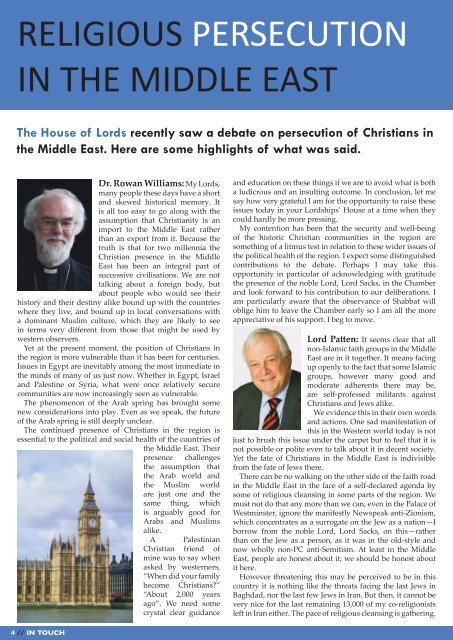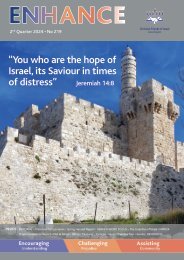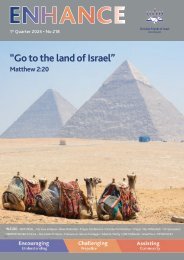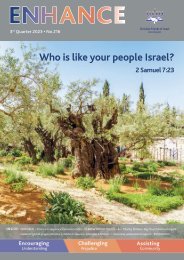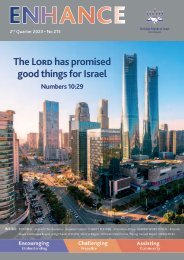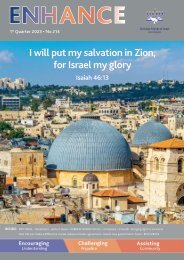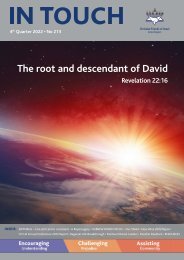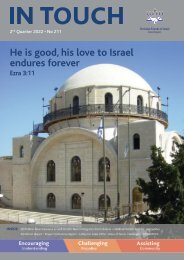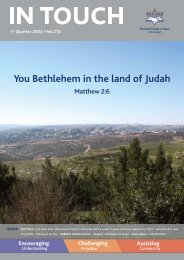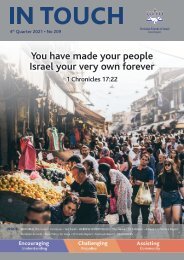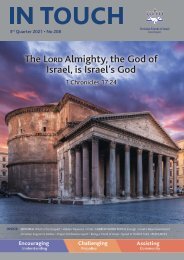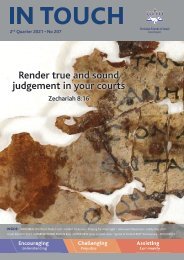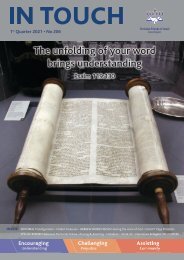In Touch Quarter 1 - 2012
You also want an ePaper? Increase the reach of your titles
YUMPU automatically turns print PDFs into web optimized ePapers that Google loves.
RELIGIOUS PERSECUTION<br />
IN THE MIDDLE EAST<br />
The House of Lords recently saw a debate on persecution of Christians in<br />
the Middle East. Here are some highlights of what was said.<br />
Dr. Rowan Williams: My Lords,<br />
many people these days have a short<br />
and skewed historical memory. It<br />
is all too easy to go along with the<br />
assumption that Christianity is an<br />
import to the Middle East rather<br />
than an export from it. Because the<br />
truth is that for two millennia the<br />
Christian presence in the Middle<br />
East has been an integral part of<br />
successive civilisations. We are not<br />
talking about a foreign body, but<br />
about people who would see their<br />
history and their destiny alike bound up with the countries<br />
where they live, and bound up in local conversations with<br />
a dominant Muslim culture, which they are likely to see<br />
in terms very different from those that might be used by<br />
western observers.<br />
Yet at the present moment, the position of Christians in<br />
the region is more vulnerable than it has been for centuries.<br />
Issues in Egypt are inevitably among the most immediate in<br />
the minds of many of us just now. Whether in Egypt, Israel<br />
and Palestine or Syria, what were once relatively secure<br />
communities are now increasingly seen as vulnerable.<br />
The phenomenon of the Arab spring has brought some<br />
new considerations into play. Even as we speak, the future<br />
of the Arab spring is still deeply unclear.<br />
The continued presence of Christians in the region is<br />
essential to the political and social health of the countries of<br />
the Middle East. Their<br />
presence challenges<br />
the assumption that<br />
the Arab world and<br />
the Muslim world<br />
are just one and the<br />
same thing, which<br />
is arguably good for<br />
Arabs and Muslims<br />
alike.<br />
A Palestinian<br />
Christian friend of<br />
mine was to say when<br />
asked by westerners,<br />
“When did your family<br />
become Christians?”<br />
“About 2,000 years<br />
ago”. We need some<br />
crystal clear guidance<br />
and education on these things if we are to avoid what is both<br />
a ludicrous and an insulting outcome. <strong>In</strong> conclusion, let me<br />
say how very grateful I am for the opportunity to raise these<br />
issues today in your Lordships’ House at a time when they<br />
could hardly be more pressing.<br />
My contention has been that the security and well-being<br />
of the historic Christian communities in the region are<br />
something of a litmus test in relation to these wider issues of<br />
the political health of the region. I expect some distinguished<br />
contributions to the debate. Perhaps I may take this<br />
opportunity in particular of acknowledging with gratitude<br />
the presence of the noble Lord, Lord Sacks, in the Chamber<br />
and look forward to his contribution to our deliberations. I<br />
am particularly aware that the observance of Shabbat will<br />
oblige him to leave the Chamber early so I am all the more<br />
appreciative of his support. I beg to move.<br />
Lord Patten: It seems clear that all<br />
non-Islamic faith groups in the Middle<br />
East are in it together. It means facing<br />
up openly to the fact that some Islamic<br />
groups, however many good and<br />
moderate adherents there may be,<br />
are self-professed militants against<br />
Christians and Jews alike.<br />
We evidence this in their own words<br />
and actions. One sad manifestation of<br />
this in the Western world today is not<br />
just to brush this issue under the carpet but to feel that it is<br />
not possible or polite even to talk about it in decent society.<br />
Yet the fate of Christians in the Middle East is indivisible<br />
from the fate of Jews there.<br />
There can be no walking on the other side of the faith road<br />
in the Middle East in the face of a self-declared agenda by<br />
some of religious cleansing in some parts of the region. We<br />
must not do that any more than we can, even in the Palace of<br />
Westminster, ignore the manifestly Newspeak anti-Zionism,<br />
which concentrates as a surrogate on the Jew as a nation—I<br />
borrow from the noble Lord, Lord Sacks, on this—rather<br />
than on the Jew as a person, as it was in the old-style and<br />
now wholly non-PC anti-Semitism. At least in the Middle<br />
East, people are honest about it; we should be honest about<br />
it here.<br />
However threatening this may be perceived to be in this<br />
country it is nothing like the threats facing the last Jews in<br />
Baghdad, nor the last few Jews in Iran. But then, it cannot be<br />
very nice for the last remaining 13,000 of my co-religionists<br />
left in Iran either. The pace of religious cleansing is gathering.<br />
4 // IN TOUCH


